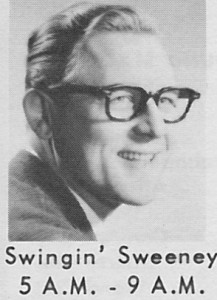 From the MCRFB news archives: 1965
From the MCRFB news archives: 1965
Recording Industry’s Record Personnel, Station Management cited for ‘Communication Blackout’ by Frank L. Sweeney, Promotion Director; Monument Records
NEW YORK — The recording music industry is suffering from a tremendous lack of understanding between record personnel (simply known in the industry as “record men”) and radio people at the management level, according to Frank L. Sweeney, former music director at WKNR, now national promotion director with Monument Records and Sound Stage 7 Records. Sweeney (known as Swingin’ Sweeney on the air in Detroit) left WKNR mid-August to join Monument Records.
“I don’t think most record people truly know how radio station people operate — and conversely, more so — precious few people at the management level understand the record business. I would like to see better liaison at the management level between the radio and record industry,” he said. “When I call at a station, besides the music librarian and the program director, I’d like to see the station manager. After all, I represent an industry which supplies him with 87.7 per cent of his product — the percentage of programming that’s based on records.”

Sweeney felt that many radio men had a generally low regard for record people that wasn’t warranted. “This relationship between radio and the record industry just sort of grew — like Topsy.” That is why he believes that a national promotion man today has to be very aware of public relations. “I want to call on a station, to get to know everybody there, even if I don’t have a record to plug with me. I want the station to think constantly, and favorably, of Monument. I want to create a new image for me and Monument — we’re sort of synonymous now. I would hope that myself, as an air-personality going into the record industry, might contribute to a better understanding between the two businesses.”
The Problem with radio, he said, is that on most modern radio stations which program the Top 40 format, the only criteria used in programming a particular record is sales… not the merit of the record itself. “We’re feeding an industry it’s programming — and free.” He said he’d once figured that an ordinary station had used roughly $2,700 in records during a year at retail prices. It isn’t that the record industry is supporting broadcasters… $2,700 probably means little over-all in broadcasting costs over a year’s time, he felt. The wrong is that station managers very seldom pays that much attention to what their station is playing. It’s immaterial to a large number of them.
“Management in radio are good hard-working people. But the truth is most of them had their basic training in sales rather than music. Some of management have precious little knowledge of programming. They say ‘Hell, we’ll play top 40’ and we’ll either do one of two things: Hire a young man whose basic job is not programming, but tabulating. Or get an old pro and turn everything over to him.
“But either way, there’s very little communication, or a lack of, between management and the man who does the programming.” The old cliche about radio stations not being in business to sell records may be, or may not be, true, he said. “But it was the choice of radio stations that records be used as the bulk of their product.”
To improve public relations between record companies and the radio business, Sweeney feels he’ll have to spend a lot of time on the road. “I can’t say the things I’ve said, and then hang around Detroit (his present headquarters) or in Nashville (headquarters of Monument Records)…. I’ve got to get out and see radio people — hopefully not only those who program the music, but the managers themselves.” END
(Information and news source: Billboard; December 11, 1965).
![]()